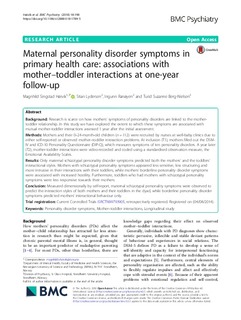Maternal personality disorder symptoms in primary health care: associations with mother–toddler interactions at one-year follow-up
Journal article, Peer reviewed
Published version

Åpne
Permanent lenke
http://hdl.handle.net/11250/2590312Utgivelsesdato
2018Metadata
Vis full innførselOriginalversjon
10.1186/s12888-018-1789-5Sammendrag
Background
Research is scarce on how mothers’ symptoms of personality disorders are linked to the mother-toddler relationship. In this study we have explored the extent to which these symptoms are associated with mutual mother-toddler interactions assessed 1 year after the initial assessment.
Methods
Mothers and their 0–24-month-old children (n = 112) were recruited by nurses at well-baby clinics due to either self-reported or observed mother–toddler interaction problems. At inclusion (T1), mothers filled out the DSM-IV and ICD-10 Personality Questionnaire (DIP-Q), which measures symptoms of ten personality disorders. A year later (T2), mother-toddler interactions were video-recorded and coded using a standardised observation measure, the Emotional Availability Scales.
Results
Only maternal schizotypal personality disorder symptoms predicted both the mothers’ and the toddlers’ interactional styles. Mothers with schizotypal personality symptoms appeared less sensitive, less structuring and more intrusive in their interactions with their toddlers, while mothers’ borderline personality disorder symptoms were associated with increased hostility. Furthermore, toddlers who had mothers with schizotypal personality symptoms were less responsive towards their mothers.
Conclusion
Measured dimensionally by self-report, maternal schizotypal personality symptoms were observed to predict the interaction styles of both mothers and their toddlers in the dyad, while borderline personality disorder symptoms predicted mothers’ interactional behaviour only.
